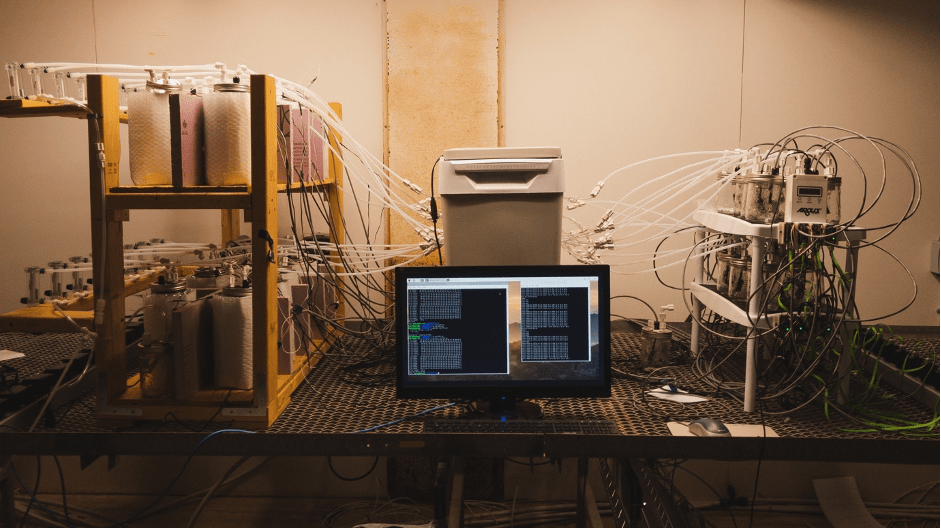By Ajwal Dsouza, graduate researcher, University of Guelph, Controlled Environment Systems Research Facility

Challenge: How can a grower manage inedible, organic waste from crop production? Solution: Developed, tested compost methods under controlled environmental conditions to maximize resource recovery Impact: New method improves sustainability, increases circularity of resource use (water, nutrients, CO2)
With the growing urban expanses, there is an increasing demand for fresh, safe, nutritious and high-quality vegetables by the urban population. Vertical Farms (VF) is capable of producing large volumes of high-quality crops with relatively lower resource input. This is achieved by growing crops in climate-controlled indoor spaces under artificial lights, providing an optimal growth environment to the plants. Crops are grown without soil in vertically stacked trays, producing crops year-round in magnitudes higher than can be produced in fields.
This sector is a key component of urban agriculture to supplement the growing urban food demands. This high-volume crop production, however, also generates a considerable amount of inedible crop residues, like the roots of leafy salad crops. These organic residues create concerns regarding waste management and environmental deterioration when landfilled. Besides, when disposed of or managed away from the VF, a portion of initially invested resources such as water, nutrients and carbon is lost from the system.
Composting the biowaste on-site not only manages waste effectively but also provides an opportunity to recover resources, namely carbon dioxide (CO2), water and nutrients. The recovered resources can be reused as inputs for subsequent crop production cycles thereby minimizing the need for fresh resources.
Ideally, the ultimate goal is to achieve a closed system wherein all the biowaste generated in the VF facility is composted on-site and recycled back into the system.
With this goal in mind, the first objective is to optimize the composting process for VF crop residues. Particularly, the research project carried out at the Controlled Environment Systems Research Facility (CESRF), University of Guelph, focuses on optimizing crop residue composting with various urban biowastes and under controlled environment conditions to derive maximum CO2 when composted.
A custom designed lab-scale composting system will be used to conduct composting tests and evaluate CO2 production. The suitability and desired proportions of urban biowastes as external feed source will be determined. Experimental results will be developed into “compost recipes” that a VF facility can readily implement.
“This partnership provides us insights that are effectively shaping the research in our lab, whereas the technology and research output will be transferred to the growth facilities of our partner.”
~ Ajwal Dsouza, Graduate Researcher, CESRF, University of Guelph
Given the certainty of urban VF expansion and the potential benefits of composting for waste management and resource recovery, the research interest on this topic at the moment is rather limited. Garnering interest among the scientific community can help address the technical challenges and expedite the progress towards commercial application. To spur discussions in the research community, we published a review article [1] in which we describe the system level concept, indicate potential environmental/economic benefits, highlight technical challenges and propose possible solutions.
The University of Guelph research team is closely working with industry partner We The Roots (Toronto, ON) on this project. We The Roots is an urban VF specializing in the production of high-quality salad crops.
Thriving on the ethos of high-quality, high-volume production of crops with reduced environmental impact, our partner realizes the environmental burden of generated biowaste and the potential of effective waste management strategies.
This partnership provides us insights that are effectively shaping the research in our lab, whereas the technology and research output will be transferred to the growth facilities of our partner.
Managing crop residues on-site can prevent landfilling and the associated environmental deterioration. Recovery of resources reduces the need for virgin inputs and the associated environmental impacts. Incorporating additional urban biowastes, for example, from restaurants or gardens, can increase the quantity of recoverable resources while contributing to urban waste management efforts. Managing waste in-house of waste and recovering resources can also provide VFs with an economic advantage. Also, these eco-friendly approaches can attract public incentives and government subsidies.
__
[1] Dsouza, A.; Price, G.W.; Dixon, M.; Graham, T. A Conceptual Framework for Incorporation of Composting in Closed-Loop Urban Controlled Environment Agriculture. Sustainability 2021, 13, 2471. https://doi.org/10.3390/su13052471
This project is funded in part by the Government of Canada through the Federal Economic Development Agency for Southern Ontario.
This project is also being funded through the Ontario Ministry of Agriculture, Food and Rural Affairs (OMAFRA) in partnership with We The Roots.
Visit University of Guelph’s Controlled Environment Systems Research Facility (CESRF) page to learn more about its resources and capabilities.

